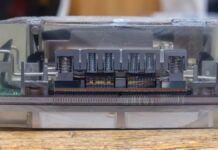Nuvia today is announcing that it closed a $240M Series B funding round bringing its total Series A and B funding to just below $300M. That is a great funding round and important as the company is looking to bring its first products to market. The fact that the company needs that figure and potentially more to get to full production shows just how hard it is to get into the server CPU space and how expensive silicon is to make.
Nuvia Gets a Refreshed Funding Round
The funding round was led by Mithril Capital in partnership with Sehat Sutardja and Weili Dai (founders of Marvell Technology Group), funds and accounts managed by BlackRock,
Fidelity Management & Research Company, LLC., and Temasek, with additional participation from Atlantic Bridge, Redline Capital, Capricorn Investment Group, Dell Technologies Capital, Mayfield, Nepenthe LLC, and WRVI Capital. Of that list, the bolded entries were listed as investors prior to the Series B funding. Previously, Nuvia closed a $53M Series A round about ten months prior. Redline Capital, BlackRock, WRVI Capital and Capricorn Investment Group were investors in the recent Innovium $170M Funding round which marks a clear focus on investing in the data center silicon market. Innovium is much further along than Nuvia as it already is shipping product for revenue with design wins at major OEMs. WRVI and Redline are also investors in Fungible F1 DPU that has news today as well. There seems to be a set of firms looking to invest in next-generation silicon.
Normally in a STH story we have a few product images. Nuvia has yet to really release product images or much information on their product aside from the fact that they are doing a custom Arm core. The company is looking to take insights from a team formerly designing mobile SoCs at Apple and applying that to a completely different market that Apple has shown no interest in, servers. It remains to be seen how the company’s products perform. In the meantime, the Ampere Altra Q80-30 we saw in Action at Ampere HQ recently landed in the Oracle cloud, and AWS is building their own Graviton chips. Marvell ThunderX3 General Purpose SKUs are canceled but the company told STH that it would still sell them custom for hyper-scale clients (Microsoft has done many ThunderX(2) demos previously.) Huawei is an example of a major OEM building their own Arm server chips. Most recently, NVIDIA announced its plans to purchase Arm which will have implications for the data center.
With the new round of funding, it will be exciting to see when the company finally delivers chips and the competitive differentiation they can achieve with “Orion” (SoC) and
“Phoenix” (cores) over Arm Neoverse V1 and N2 offerings.




